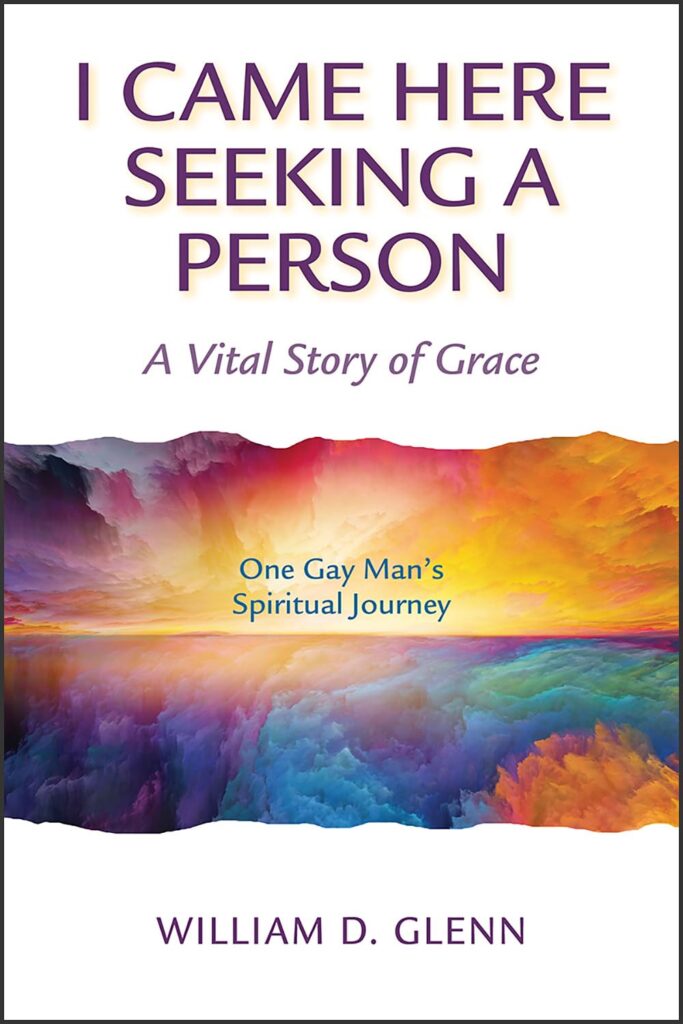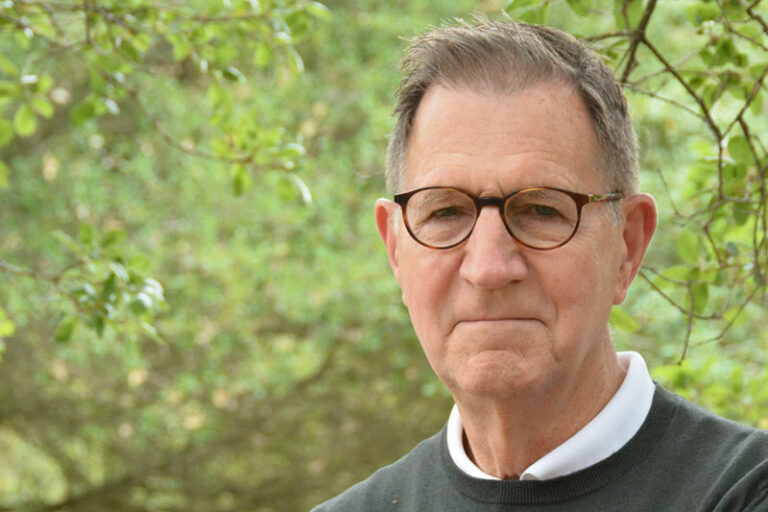The following is a revised excerpt from the book, I Came Here Seeking a Person: A Vital Story of Grace by William D. Glenn. This excerpt has been edited for style and clarity.
Though I have butched up pretty good in the ensuing decades, I was a somewhat soft boy at my Jesuit high school. It was no place for sissies. After a difficult freshman year, I begged my parents to transfer me to the local public school. That request, to my father, was ridiculous. Little did he know how ashamed and deeply isolated I felt inside, while a student in this revered high school.
As eros bloomed inside, I lived in fear that I would be exposed, found out. I lived in dread that I would be discovered as this despised thing whose name I did not know, but whose negative associations I could see and feel all around me.
All was not bad. I had some wonderful teachers: Jesuits and lay alike. My senior English teacher, a layman and a coach, particularly affected me: he taught us to write from our feelings and he showed us respect and affirmed our dignity. A man for others. And I made vital life-long friendships.
As eros bloomed inside, I lived in fear that I would be exposed, found out.
Paradoxically, my nascent faith deepened as it also grew pale. I encountered Jesus in a new way. And I was introduced to rudimentary Ignatian wisdom, that incomparable combination of a psychologically grounded spirituality, honoring intuition and insight, a contemplative posture that fostered religious imagination and presence
But this prep school was a difficult place for an—albeit deeply closeted—gay boy. Back then, it strongly exemplified the dominant culture’s values, values anathema to the development of whole persons, values particularly perhaps unwittingly suited to molding boys into narrow and constricted men. So much of that—thankfully—has changed, but of course, remnants (some most durable, both overt and covert) remain.
Let two incidents suffice. At our homecoming football game at the Municipal Stadium my freshman year, I was sitting with a friend when two guys from my homeroom approached. One said: This is the one and proceeded to cuff my collar and pull me up out of the bleacher.
The other sucker-punched me, then threw me back into my seat and walked away, scornfully laughing. They imparted the knowledge I dreaded: We’re onto you. I lived with that daily fear, believing that somehow, I deserved what I got for being the one, the one they were all onto.
All our culture’s words and notions and judgments came home to roost in … a young gay boy that the world, let alone his parents, could not know.
In sophomore year, I fell-in-swoon. I fell in swoon like nigh all high school boys do, though unlike my friends, I was not falling for a girl. I was falling for a boy, one who sat a row away from me. It felt overwhelming. I was excited and alarmed and scared. There was no one with whom to speak, no one with whom to share these feelings or even acknowledge that the feelings existed.
I felt then the beginnings of what I would feel profoundly until my 29th year: I was alone in this. In the most riveting sense. And alone I believed I would always be, with no language, no community, no symbol nor myth, no conversation, no dialogue, no hope.
What did adhere in high school and in the world in which I lived were the messages the dominant culture proffers. During puberty’s final onslaught, I came to believe I was beyond the pale of grace. I came to know I was unacceptable in the eyes of the world. All our culture’s words and notions and judgments came home to roost in me, a 16-year-old boy, a young gay boy that the world, let alone his parents, could not know.
But, finally, and primarily, I grew to believe that I was unacceptable as a human being in the eyes of God. In the truest sense, I did not know why, for this thing that had visited me, not of my making nor at my initiative.
The more I prayed to be changed, which was the heart and content of my prayer (so deeply aware that I had not chosen this, but come to believe it was visited upon me because of my sinfulness), I regarded my not changing as God’s further judgment on me that my prayer, and my life, were insincere, beyond the pale of believability. I was not available to the strands of grace everyone else seemed to somehow merit.
This is the terror for many queer boys and girls: We are alone.
The One I called God, and my dear companion Jesus, previously the source of such great succor in my life, were taken away. Or they left. Or I could not find them. They somehow necessarily abandoned me to despair because this person I had become could manage no change, could not desist either my feelings nor my desires, no matter how hard I fought them or prayed to be delivered from them. I was alone.
This is the terror for many queer boys and girls: We are alone. We suffer without the comfort and love of a mother or a dad, of friends or even the odd solace of the cosmos. No one with whom to share this terrible fate. We believed all the culture’s heinous images, holding our young selves responsible for this sick, perverted condition.
I think, sometimes: Really, who would wish this on their enemy? Let alone their child, or their friend. But this is what yet happens to gay boys and girls in this culture, even in some Catholic high schools. And even as we work to change the culture, this, nonetheless, still provides dark political currency. And in many parts of the developing world, it is far worse.
On the inside, queer young people experience a circular existence of guilt, shame, expiation, both inescapable and from which there was no relief. On the outside, we adapt … or not. I straightened up, and hyper-developed a best little boy in the world image to appear, in others’ eyes, as one of you, knowing all the while I was not nor never would be.
When I hit college, I found alcohol. In copious amounts. It obliterated the feelings and offered desperately desired relief. And this worked for a dozen years, or so I thought. Twelve summers after discovering the warmth and relief of my deadly pal from the psychic onslaught that continued unabated, I got sober. One month later, for the first time, after so many years of my own hiding, I came out to myself. I finally wrote I am a gay man.
I was 30 years old.
One month later, for the first time, after so many years of my own hiding, I came out to myself.
With the conviction only a reformed drunk could muster, I vowed never to live in fear again. And, at whatever cost, I would be myself.
As a psychotherapist for 35 years, primarily to queer folks, I have come to know so clearly my story is a version of nearly every queer youngster’s coming out story. And these stories will continue until the dominant culture—which suffers exquisitely from its own homophobia—withdraws its enormous and blinding sexual shadow. But we are not required to live any longer in its deadly grip. And as out queer persons, we are charged with providing healthy models for the spiritual and psychological lives of other queer kids.

As providence would have it, I came to understand this biological, psychological and spiritual dimension of myself, my gayness, as the source of enormous grace and wisdom.
I am deeply grateful, most likely in inverse proportionality to my previous despise, for being gay, for the grace of this path, for the deep freedom coming to terms with this gift has given me. As we are always coming out, the interior work continues. I’ve had returned to me my compelling and demanding companion, Jesus, who of course never left at all.
The overwhelming thrust of the Gospels—Jesus’ ministry at the margins to the unrecognized and dispossessed, his clear living of the twin paradigms of justice and love—is no longer just a model for me. His presence is bred into my bones, into my soul. And I have come to know that our lives as queer human beings are essential in the economy of grace for the world, essential to the healing of the world, essential to the transformation of all persons into the full mystical body of Christ.
As out queer persons, we are charged with providing healthy models for the spiritual and psychological lives of other queer kids.
So, my story comes, though skewed, full circle. I am yet that boy who came to my Jesuit high school decades ago to learn how to become a man, a person. And with the help of grace, I am doing just that. As I approach three-quarters of life on this verdant planet, I am fully alive, the person that God intended me to be at the moment of my conception. And you, too.
For we are created exactly as God intended us to be.
For we are not damaged goods nor disposable—in any way.
For we and the love we provide are essential. We are a mysterious grace necessary in God’s plan for the world.




